Cape of Good Hope: Visiting a township in South Africa
Twenty years on from South Africa’s first democratic elections, Meera Dattani heads into the Gugulethu township for a tour that offers hope above everything else.
This is not my first township tour but already it feels different. For starters, we’ve not peered into anyone’s house or snapped photos of locals from inside the minibus. Instead, I’m standing outside a warehouse where people are browsing and buying fresh fruit and vegetables that are piled high on a long table.
I’m in Gugulethu, a township in the Cape Flats outside Cape Town. The warehouse is the headquarters of Harvest of Hope, an initiative spearheaded by Christina Kaba. She’s brought together around 200 community gardens to sell their goods, and business is booming. Some of the produce here, the leeks and lettuces and carrots, will even end up in the kitchens of Cape Town’s 5-star Mount Nelson Hotel.
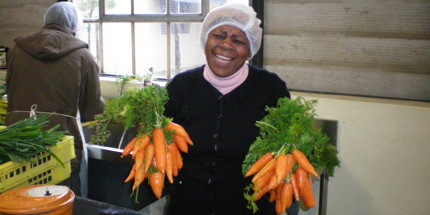 Harvest of Hope carrots can end up in the kitchen of a 5-star hotel
Harvest of Hope carrots can end up in the kitchen of a 5-star hotelUthandosa
The tour itself is run by the non-profit organisation, Uthando, and led by Xolani Maseko whose knowledge of South African history is wildly impressive. Harvest of Hope is just one of the projects they support and the money from these tours part-fund and kickstart these types of community development initiatives.
Driving through Gugulethu, both progress and stagnation are evident. Two decades after South Africa’s first democratic elections, you’d hope the oppressively hot, corrugated iron shacks would have been pulled down, but not so. However, there are newer brick houses around these days and the makeshift barber salons and kerbside traders co-exist alongside banks and mobile phone shops. It’s better than 20 years ago, Xolani says.
We pass another Uthando-supported project, Kiddies Educare, a pre-school daycare centre run by Margaret Makhafola. Inspired to teach after discovering her daughter had autism, Margaret shows us around the nursery and we meet two classes of beaming children. As a tutor, she is a force to be reckoned with: she speaks several South African languages, plus English, and has a fearless approach when it comes to the children. “I’ll do home visits if I think something’s not right,” she says.
As we leave Gugulethu, we stop by the bronze plaque commemorating white, American anti-apartheid activist Amy Biehl, murdered here in 1993. It’s a reminder that the years between Nelson Mandela’s release in 1990 and the 1994 elections were actually some of the bloodiest of South Africa’s apartheid era.
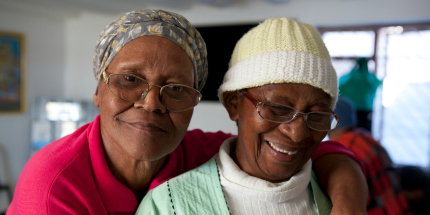 NOAH is a centre where over-65s can socialise
NOAH is a centre where over-65s can socialiseUthandosa
Our next stop is Khayelitsha or ‘new home’. Created in the 1980s, it’s Cape Town’s largest township, home to around 1.2 million people and growing. It’s a mini-city. Xolani points out the different neighbourhoods, railway stations, shops and its new hospital as we head for the Neighbourhood Old Age Homes, affectionately called NOAH. “You’re going to meet the oldies,” says Xolani.
NOAH is a community centre where over-65s can socialise and have lunch. We’ve heard they’re always up for conversation and a bit of a singsong too, so it doesn’t take long until we’re engaged in an impromptu Q&A session about our lives, jobs and what we think of South Africa. They’re as interested in us as we are in them. “It breaks down barriers,” explains Xolani. “Many wouldn’t have chatted on an equal basis with non-blacks 20 years ago.”
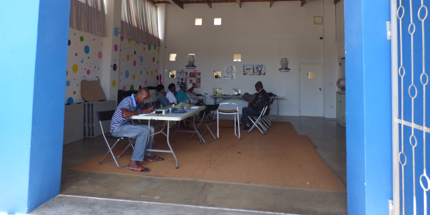 The Ekhaya Ekasi centre teaches locals new skills
The Ekhaya Ekasi centre teaches locals new skillsMeera Dattani
That’s a sobering thought. Xolani tells us NOAH organises visits to places such as Kirstenbosch Gardens and Table Mountain, once off-limits during apartheid. While many of the ‘oldies’ experienced little freedom until their later years, it has not dampened their spirits. As predicted, they want to sing before we leave and the air is filled with apartheid struggle songs. You only need a smattering of knowledge about South African history for these melodies to give you goosebumps within seconds.
Before we finish, Xolani wants to show us one more place in Khayelitsha. Ekhaya Ekasi is a social centre which uses education and arts to improve local lives. There’s a stainless steel kitchen where families can learn to cook inexpensive meals and where apprentices train for catering jobs. As we enter, two boys are learning the crafts of fabric-painting and beading. “They also learn small business skills to encourage entrepreneurship,” Xolani tells me.
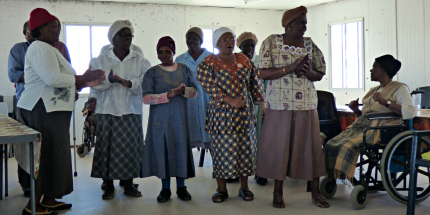 The NOAH girls striking up a chord
The NOAH girls striking up a chordMeera Dattani
That’s what makes this tour different: it creates real change in people’s lives. Originally, it was the sights and experiences of the Eastern Cape during the 1980s apartheid that inspired James Fernie to set up Uthando, and now it’s Fair Trade in Tourism-accredited and the winner of the Cape Town Tourism Responsible Tourism Award in 2013.
Many tours gloss over the complexities of these communities, offering little more than a drive-through, a photo opportunity and some souvenir shopping. Often at hyped-up prices, these tours have minimal community benefit. Until the end of apartheid in 1994, blacks, coloureds, Indians and others were often forcibly removed from their homes to live in the townships. For that reason alone, they’re an important part of South Africa’s history, and Uthando acknowledges both the beauty and the beast that lies within.
-------------------------------------------------------------------------------------
Tips for choosing a township tour
Ask how the tour makes a difference. As responsible tourism expert Dr Xavier Font says, “Certification alone isn’t enough – many legit companies will be certified. What’s important is evidence of contributing.”
Small group tours, a close connection between operator and project, and giving back to the community are also key. Uthando’s James Fernie says he steers clear of touristy experiences, instead focusing on locally driven projects which need funding.
Dr Font adds: “Sometimes, we leave our ethics at home when we travel. You should be experiencing something locals wanted to do anyway; it means they’ve chosen to be there.”
IDEAL FOR...
Anyone who wants to visit a township in a conscientious way, rather than photographing a ‘human zoo’.
WORTH THE PRICE?
Yes. It’s a chance to talk to interesting people who are creating opportunities for themselves and others.
ROOM FOR IMPROVEMENT
Uthando’s sensitive, ever-evolving approach is commendable. However, our presence felt slightly intrusive in the daycare centre. But in a true catch-22 situation, donations from the visits are instrumental to its success.
TIPS:
Incident-free township tours take place daily, but it’s advisable to leave any valuables behind. Wear comfortable clothes, especially on a windy Cape Town day.
RATING:
4.5/5
DETAILS:
Starting Point: Pick-up from Cape Town accommodation.
Times: Morning and afternoon tours are available on request. Tours take place year-round.
Price: ZAR720 (£40) for a half-day tour visiting at least three projects. Book through www.uthandosa.org.
Do you have any Feedback about this page?
© 2026 Columbus Travel Media Ltd. All rights reserved. No part of this site may be reproduced without our written permission, click here for information on Columbus Content Solutions.






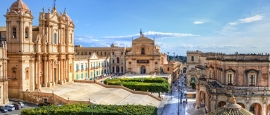


 You know where
You know where